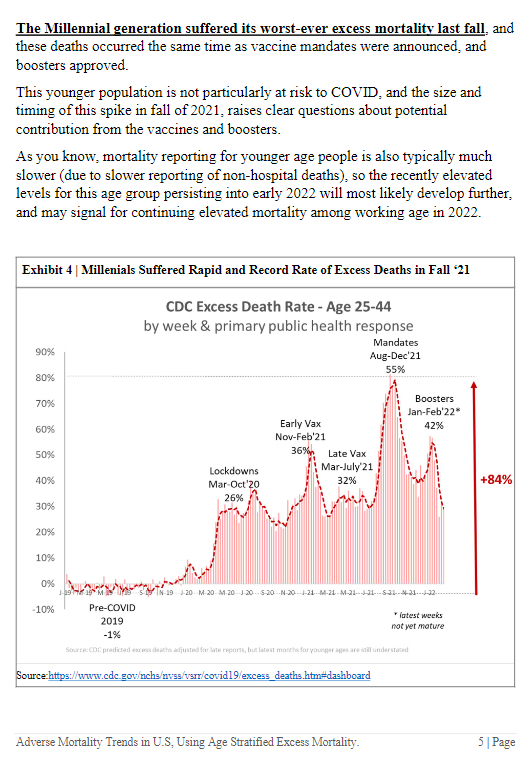‘Former BlackRock Portfolio Manager, Investor Edward Dowd, Explains Bombshell ‘Fraud’ Charge re Pfizer Hiding Deaths Data; Many Media Outlets are ‘Accomplices to Murder’ DO NOT MISS. Historic.’

Browse the articles related to this topic below.
Join our community on Guilded.
‘Former BlackRock Portfolio Manager, Investor Edward Dowd, Explains Bombshell ‘Fraud’ Charge re Pfizer Hiding Deaths Data; Many Media Outlets are ‘Accomplices to Murder’ DO NOT MISS. Historic.’

We are plunging headlong into the greatest economic transition in history. We don’t have to speculate about that, either.
NHS cash is being spent on football season tickets, National Trust memberships and renting beach huts, an investigation has revealed.
Restaurant meals, Amazon Prime membership, PlayStation consoles and theme park passes have also been funded under the health service system of “personal budgets”.
Proceeds from the sale are marked for research and development expenses and the manufacturing and distribution of Covid-19 vaccines. The New York-based pharmaceutical company sees the vaccine bringing in $33.5 billion of revenue this year, which would make it one of the top-selling medicines ever.
Whitney Webb is interviewed by the Investigative Corona Committee Germany about who is influencing the conversation around COVID-19. Her interview starts at 1h09m.
Interview notes:

Backup mirrors:
IFFIm’s financial base consists of grants from 10 sovereign sponsors. By signing the grant agreements, countries agree to pay these obligations in a specified schedule of payments.
| Country | US$ equivalent | Currency of pledge |
|---|---|---|
| United Kingdom | US$ 3,652 million over 23 years | GBP 2,130 million |
 France France | US$ 1,884 million over 20 years | EUR 1,390 million |
| Italy | US$ 821 million over 25 years | EUR 654 million* *Includes a pledge to support the Coalition for Epidemic Preparedness Innovations (CEPI) through Gavi for the development of COVID-19 vaccine candidates. |
 Norway Norway | US$ 647 million over 25 years | US$ 27 million & NOK 5,100 million* *Includes additional pledges to support the Coalition for Epidemic Preparedness Innovations (CEPI) through Gavi for the development of COVID-19 vaccine candidates |
 The Netherlands The Netherlands | US$ 487 million over 20 years | EUR 330 million & US$ 67 million |
| Australia | US$ 284 million over 20 years | AUD 288 million |
 Spain Spain | US$ 240 million over 20 years | EUR 190 million |
 Sweden Sweden | US$ 38 million over 15 years | SEK 276 million |
| South Africa | US$ 20 million over 20 years | US$ 20 million |
 Brazil Brazil | US$ 20 million over 20 years | US$ 20 million |
| TOTAL | US$ 8 billion (approximately) |
http://archive.today/2021.05.28-164114/https://iffim.org/donors
Social bonds are an attractive investment for worldwide institutional and individual investors looking for a socially responsible investment with a clear, unambiguous purpose and a portfolio diversification opportunity with attractive risk-adjusted returns. Although the social bond market has been growing fast, it has so far remained a niche sector.
…Over the last few weeks, several social Covid-19 bonds have already been issued by a number of multilateral institutions and public agencies and are already generating significant investor interest, paving the way for more issuances. The stage is now set for social bonds to move from a niche solution to a mainstream one.
Socially conscious bond investors will be targeted in a coming wave of vaccine bond deals that will seek to provide billions of dollars for the speedy rollout of COVID-19 shots for developing countries.
At a panel discussion about the Great Reset hosted by the World Economic Forum in mid-November, former Secretary of State John Kerry – Biden’s would-be special presidential envoy for climate – firmly declared that the Biden administration will support the Great Reset and that the Great Reset “will happen with greater speed and with greater intensity than a lot of people might imagine.”
Drugs are a risky business and, for equity investors hoping to eventually share in the profits, each stage of development presents an escalated risk. Lo reasoned that substantially lowering the risks, even if it meant correspondingly lowering the rewards, could attract investment instead from ordinary bond markets—that is, from managers of pension funds, university endowments, and sovereign-wealth funds, who control a great deal of money and generally invest in low-risk, low-return assets.
Given how uncertain vaccine markets are, the paper notes, governments (“public-sector interventions,” and so forth), would need to guarantee a vaccine bond by committing in advance to purchase and stockpile vaccines. The paper’s most creative suggestion is for a subscription model, a kind of vaccine Netflix, where governments would pay an annual fee to a new international-development fund, one that could perhaps be managed by the G7. The fund could float a bond to both advance vaccine biotechs and to make market commitments to Big Pharma. The virus, the markets, and the science are global.
…it would be much better for the government to say that the money is not from taxpayers. “We’re borrowing it from the rest of the world. And if and when you succeed, or any of the other hundred and fifty projects—that could have been funded, but aren’t being funded right now—succeeds, all the bond holders will get paid. That would be great. Everybody earns a return.”